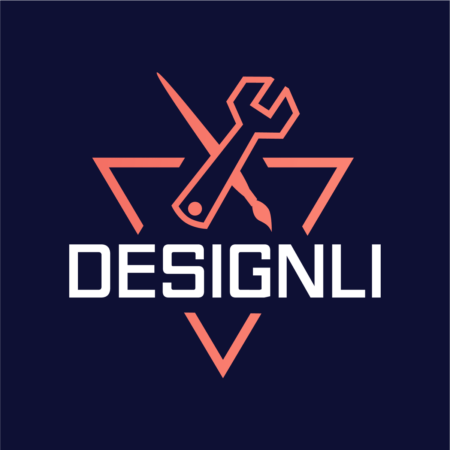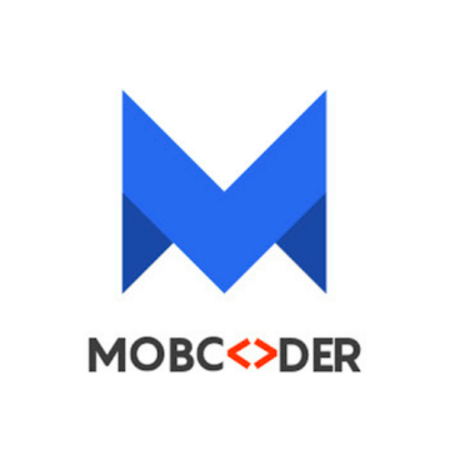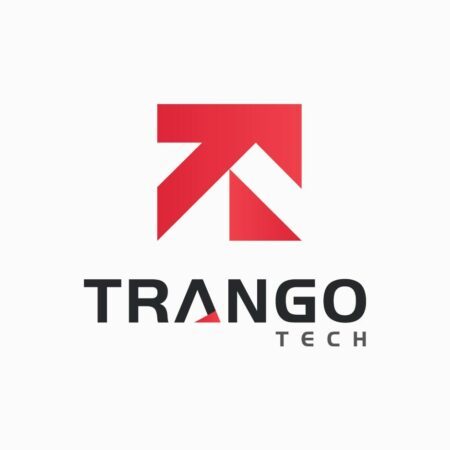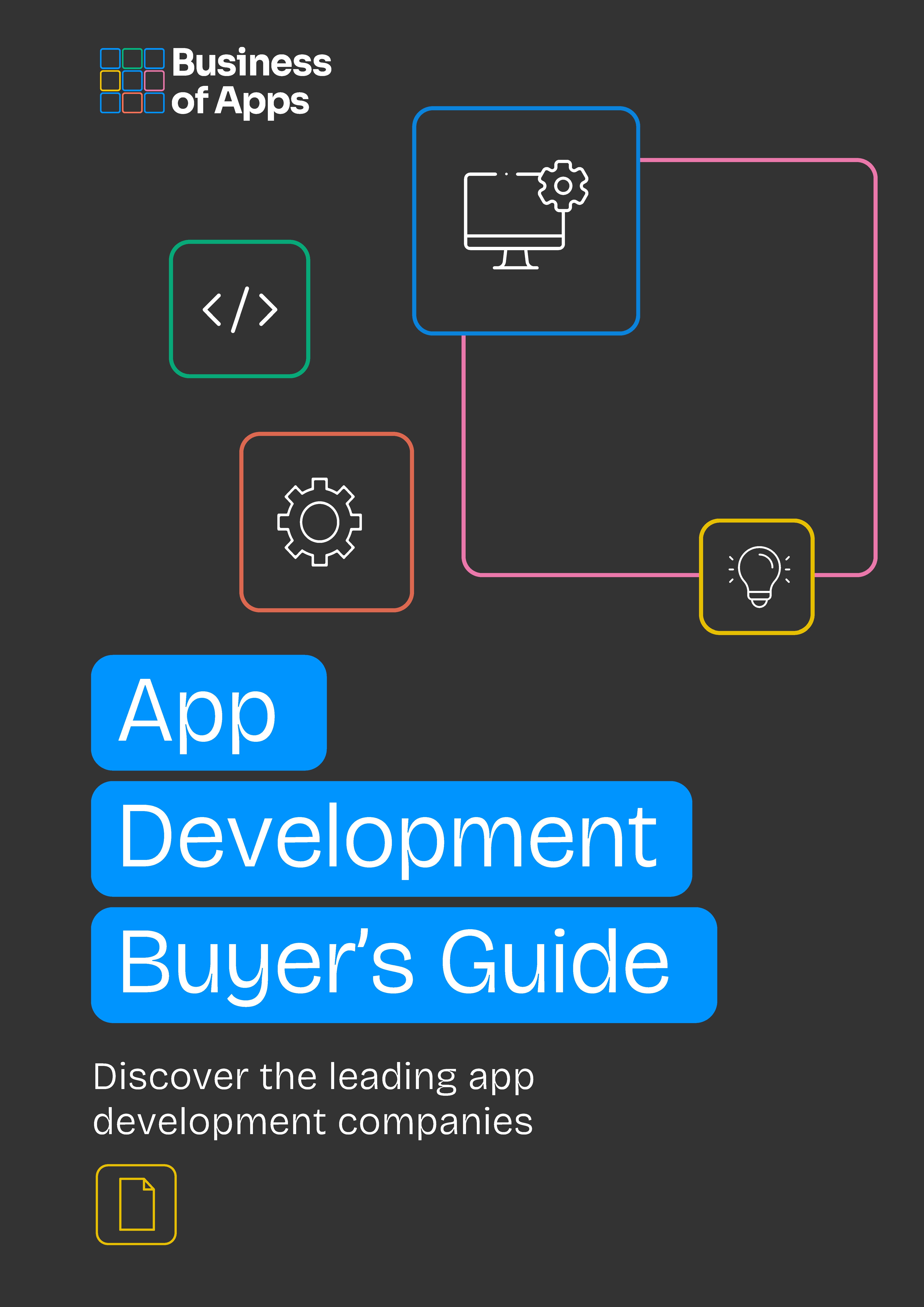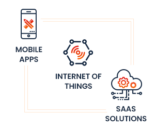An eCommerce app development company plays a vital role in transforming businesses by creating powerful, user-friendly apps that drive online sales.
This guide explores the top eCommerce app development companies in the industry, detailing their services, pricing models, and key features that set them apart.
By leveraging the expertise of these companies, marketers can tap into a growing mobile shopping trend and enhance their customer engagement.
With the increasing shift to mobile shopping, eCommerce app development companies have become indispensable for businesses aiming to capture the attention of smartphone users.
This guide will help you understand why choosing the right eCommerce app development company can give your brand a competitive edge, streamline user experiences, and ultimately boost revenue.
Why do you need an eCommerce app development company?
The importance of an eCommerce app development company today speaks for itself. By 2025, mobile commerce will generate more than ten per cent of all retail sales in the US. An eCommerce app development company adds significant value to the chain of circumstances that manage business transactions.
Yet building and developing successful eCommerce apps requires a number of must-have features to be implemented.
App Development Buyer's Guide
Download our App Development Buyer’s Guide to get a full list of the best service providers on the market to choose from. You will also learn about types of app developers, different app development platforms, app developer locations, app development costs, how to select the right one for your business, as well as the questions to ask any of those companies you will be evaluating.
For example, push notifications allow you to send out alerts and offers to your customers. At the same time, the need for social media integration—so that shoppers can share product reviews between social accounts—is vital.
That’s without mentioning the importance of having multiple payment options, geolocation features, and an efficient search bar. In other words, it can be challenging to know where to start if you’re entering the world of eCommerce app development.
Fret not; we’ll cover everything you need to know.
Featured eCommerce App Developers
The best eCommerce app developers
eCommerce app developers are professionals who specialize in designing, building, and maintaining mobile apps for online shopping platforms.
These apps enable businesses to sell products or services directly to consumers through mobile devices.
We’ve listed the best eCommerce app developers below.
1. NMG Technologies
NMG Technologies is an eCommerce app development company that offers a wide range of services, including web and mobile app development, eCommerce solutions, custom software development, and digital marketing.
NMG worked on the Musicbed mobile app, a platform offering music licensing, where users can browse and purchase tracks directly from their devices. NMG blended its mobile tech with custom eCommerce solutions, delivering a smooth and efficient shopping experience for mobile users.
Overview
NMG Technologies serves a global client base that includes startups, SMEs, and large enterprises. The company strongly emphasizes quality, timely delivery, and customer satisfaction.
Their client base spans various industries, including healthcare, finance, retail, and education.
Services
NMG Technologies provides its customers with the following services:
- Custom eCommerce platform development using tools such as Shopify, Magento, and WooCommerce
- Development of native and cross-platform mobile apps for iOS and Android
- Focuses on creating user-friendly, scalable apps tailored to the client’s specific needs
2. Light IT Global

Light IT Global is an eCommerce app development company that delivers innovative web and mobile solutions for startups and enterprises. With over 18 years of experience, they have completed over 500 custom projects for clients worldwide, including in Europe, the United States, and Japan.
In collaboration with Pfizer, Light IT Global developed a robust mobile eCommerce platform to support the company’s global operations. The platform enabled seamless transactions, improved inventory management, and provided real-time analytics.
Overview
Light IT Global was founded in 2006 in Ukraine. The company began as a small team of three individuals engaged in reconstructing local historic landmarks. Over time, it transitioned into a software engineering firm, expanding its services to include web and mobile development, IT consulting, and business digital transformation.
Today, Light IT Global employs over 100 professionals and has completed over 500 custom projects for clients worldwide.
Services
Light IT Global provides its customers with the following services:
- Designing and building mobile apps for iOS and Android that support eCommerce, business operations, and customer engagement
- Developing robust, secure, and scalable eCommerce platforms that integrate smoothly with payment gateways
- Crafting intuitive and visually-appealing designs that enhance the user experience and boost engagement
3. App Maisters

App Maisters specializes in mobile app development and digital solutions. The company is able to develop apps that meet the specific needs of larger organizations.
App Maisters developed a mobile messaging and eCommerce platform for a startup based in West Babylon, New York, allowing store owners to interact with shoppers and enable them to complete purchases via SMS. The solution included features such as ‘Send2Mobile,’ ‘Let me Know,’ and ‘Make an Offer’ buttons on Shopify product pages.
Overview
App Maisters was founded in 2017 by Fahim Iqbal, the current CEO. Under Iqbal’s leadership, App Maisters has grown and established itself in the app development industry, helping companies across various sectors build innovative mobile apps.
App Maisters has worked with a variety of clients, including brands such as PepsiCo, ExxonMobil, and Shell.
Services
App Maisters provides its customers with the following services:
- Crafts intuitive, attractive, and functional app designs
- Builds apps that work across multiple platforms (iOS and Android) using frameworks such as Flutter, React Native, and Xamarin
- Develops prototypes to visualize the app before full-scale development begins
4. Designli

Designli is a software development firm that offers a comprehensive range of services, including UX/UI design, mobile app development, web app and cross-platform development. Their approach focuses on delivering high-quality, user-friendly solutions tailored to meet the specific needs of their clients.
NTS offers trench and traffic safety equipment rentals, often facing challenges in tracking rental agreements and payment terms—Designli modernized their outdated portal by developing the WorkZone web app, providing a unified customer view with data integrated from the Infor ERP system. This solution streamlined rental management and improved efficiency.
Overview
Designli was founded in 2013 by Joshua Tucker and Keith Shields. The company is based in Greenville, South Carolina, and focuses on providing design and development services, particularly for custom mobile and web apps.
Services
Designli provides its customers with the following services:
- Offers professional design services to craft intuitive and visually appealing user interfaces
- Helps clients define their product goals, target users, and market strategies
- Builds apps that work across multiple platforms, ensuring broad accessibility and functionality
5. Trango Tech

Trango Tech is a tech services and eCommerce app development company aimed at helping businesses enhance their digital presence, streamline operations, and innovate their product offerings.
Trango Tech has collaborated with various clients to develop tailored eCommerce solutions. For instance, they have provided Shopify development services, including store development, app development, and integrations, to enhance online retail experiences.
Overview
Trango Tech was founded in 2017. The company was established with the goal of providing innovative tech solutions, particularly in the areas of mobile app development, web development, and IT consulting.
Since its founding, Trango Tech has worked with clients across various industries to help them build custom software solutions that meet their business needs.
Services
Trango Tech provides its customers with the following services:
- Provides customized eCommerce platforms to help businesses sell products online effectively
- Develops software that enhances enterprise-level systems and helps with automation, integration, and data management
- Offers cloud-based solutions for data storage, scalability, and infrastructure management
6. Slashdev.io

Slashdev.io is an app development company that connects businesses with top-tier remote software engineers. They offer flexible freelance contracts at competitive hourly rates, enabling companies to focus on their core competencies without the extra challenges of recruiting.
Slashdev.io was tasked with developing a high-performance Android eCommerce app to provide users with a seamless shopping experience. The result was an app that offered a smooth, intuitive experience with minimal loading times and a visually appealing layout.
Overview
Slashdev.io was founded in 2019 by Michael Ballard and Patrich Söderström. Michael Ballard is the founder and CEO, bringing a background in software entrepreneurship and a passion for helping entrepreneurs.
Patrich Söderström co-founded the company, contributing to its mission of connecting businesses with top-tier software engineers worldwide. The company primarily works with SaaS and software product startups.
Services
Slashdev.io provides its customers with the following services:
- Offers end-to-end software solutions, helping businesses design, develop, and deploy scalable apps
- Provides access to top-tier remote engineers to seamlessly extend in-house teams
- Delivers intuitive, high-performance mobile apps that boost both engagement and reach
7. Mobcoder Inc

Mobcoder Inc is a tech company that specializes in mobile app development and custom software solutions.
Mobcoder typically offers services such as app design, development, testing, and deployment. The platform aims to streamline the process of finding and working with developers by providing a marketplace for various app development needs.
Mobcoder Inc. was engaged to develop a B2B (Business-to-Business) eCommerce app for General Mills, one of the largest food companies globally. The app successfully streamlined B2B processes, significantly improving vendor satisfaction as well as adding a dedicated rewards program; as a result, vendors became more engaged and motivated.
Overview
Founded in 2011, the company focuses on delivering high-quality mobile and web applications, providing end-to-end development services, and helping businesses achieve their digital transformation goals.
Their clients typically span a range of industries, including healthcare, finance, and retail.
Services
Mobcoder Inc provides its customers with the following services:
- Creating native eCommerce apps for iPhone and iPad using Swift and Objective-C
- Offers continuous support and updates to keep apps running smoothly and efficiently
- Designs intuitive and user-friendly eCommerce experiences for mobile and web apps
What is an eCommerce app?
An eCommerce app (also known as a mobile commerce app) is software that allows customers to browse and purchase items from an online store via their mobile devices, whether that’s using their phone or tablet.
The best eCommerce apps are good for both customers and brands. Customers get more personalisation and can better control their shopping experience, and brands enjoy more engaged customers that stick around for years to come.
A few years ago, creating an eCommerce app or a mobile site was essentially a luxury, but now it’s becoming more of a necessity for retailers as consumer attitudes and behaviour continue to change.
Customers find eCommerce apps to be both enjoyable and valuable during the shopping experience, with features such as wish lists, loyalty and membership options and managing orders and returns wherever they are–within a short amount of time–highly convenient.
Types of eCommerce apps
Examples of eCommerce apps can be found in retail, finance, and manufacturing with both mobile and web apps. The apps typically fall under one of these four categories:
- B2B (Business-to-Business) — Amazon Business, Quill
- B2C (Business-to-Consumer) — Amazon, Domino’s
- C2B (Consumer-to-Business) — GitHub, Clutch
- C2C (Consumer-to-Consumer) — OLX, eBay
Some brands sometimes blend two or even more of these models together. The aim, of course, is to pick the right one for you, so take the time to get this part right.
Business-to-business eCommerce example
 Source: Amazon Business
Source: Amazon Business
Other app types include eCommerce ticket booking and aggregator apps.
Ticket booking eCommerce apps are used to make bookings for cabs, hotels, live shows, games, and parties, while aggregator apps (Etsy Inc) group together and list offerings, items, or products by offering a unified platform for different service providers.
What does an eCommerce app development company do?
An ecommerce app development company plays a crucial role in helping businesses succeed in the competitive world of mobile commerce. These companies offer a range of services, from designing and developing custom apps to integrating secure payment gateways and providing ongoing maintenance.
By leveraging their expertise, businesses can create high-quality apps that deliver seamless shopping experiences and drive customer satisfaction.
Custom app design & development
An ecommerce app development company specializes in creating custom mobile applications tailored to a business’s unique needs. This includes designing user-friendly interfaces that provide seamless navigation and an engaging shopping experience.
By understanding the specific goals of a business, the company develops apps that align with brand identity and optimize the user journey.
Integration of payment gateways
One of the core services provided by ecommerce app development companies is integrating secure payment gateways into the app. This ensures customers can make transactions safely using various payment methods like credit cards, digital wallets, or bank transfers.
Security features, such as encryption and fraud detection, are built into the payment process to protect both the business and the customer.
Backend development & API integration
An ecommerce app development company also handles backend development to ensure smooth app performance and scalability. They integrate essential APIs, such as inventory management, shipping services, and customer relationship management (CRM) systems.
This helps businesses automate operations and provide real-time updates to their customers.
Maintenance & support
After the app is launched, ecommerce app development companies provide ongoing maintenance and support to ensure it runs smoothly. This service includes fixing bugs, updating the app to stay compatible with new operating systems, and enhancing features as needed.
Regular maintenance keeps the app optimized and ensures a seamless experience for users.
Testing & quality assurance
Before launching an app, these companies conduct rigorous testing to ensure high performance and reliability. They perform quality assurance checks to identify and fix any bugs or glitches, ensuring that the app meets the highest standards of functionality and security.
This process is critical to delivering an app that performs well under different conditions and devices.
What do eCommerce app development services include?
Brands need the best eCommerce app possible, one that loads quickly, runs smoothly, looks the part, and isn’t plagued by endless bugs.
Ecommerce app development services come down to following a well-defined process that ensures nothing gets missed along the way.
Their services cover everything from finding a unique marketing idea to testing and maintenance.
Let’s take a look at the steps that an eCommerce app development company takes to help build your product:
1. Identify the niche
The first step to developing an eCommerce app is to select a suitable niche. You need to think about things such as the items you want to sell and, of course, who you’re aiming to sell them to in the first place.
This will be a preliminary look at everything from their age to their spending patterns and the time they spend using mobile devices.
2. Target audience research
Once that’s done, you need to determine the users who will most benefit from your app. You can do this by categorizing them by gender, age, occupation, and main interests.
The aim here is to understand which of your products will best help your consumers (and solve their problems). Once you know this, you’ll have a good idea of how you want to proceed overall.
3. Competitor analysis
Next, you’ll need to analyze your competitors. While this is an important part of many industries, eCommerce niches are some of the most competitive online platforms in general.
Therefore it’s important to analyze your competitors, find out the advantages you have against them, and research the promotional tools and how long it took them to become successful.
After that, you’ll be in a much better position to be able to list the features of your eCommerce app.
4. Planning important features
Here you need to think about the essential features of your app. The user experience is a big part of this, and really, it’s all about ensuring it’s as good as possible.
For example, almost all eCommerce apps will need authentication features, a social media login function, customer support service, push notification functionality, various payment options, and a rating and review system.
5. Preparing design elements
In this step, you need to think about a design that can effectively read the user’s mind and win them over. You need to consider everything from mapping, highlighting, working on registration measures, and more.
Here are some solid foundations to help get you started:
- Use a basic one-section structure to showcase your products
- Keep it simple when it comes to the cart, search, and wishlist features
- Create it so that individuals can get more information on a product, but only when they want it
- Keep graphics minimal and the interface clear and simple
- Ensure that you design an attractive logo that remains memorable
6. Choosing a platform and development
Now you need to decide whether your want your app to be on iOS or Android–neither platform is superior.
Before choosing, consider the region of your business; for instance, in North America and most of the EU, iOS apps perform well–in Asian countries and the Middle East, Android is a better bet.
eCommerce app developer example
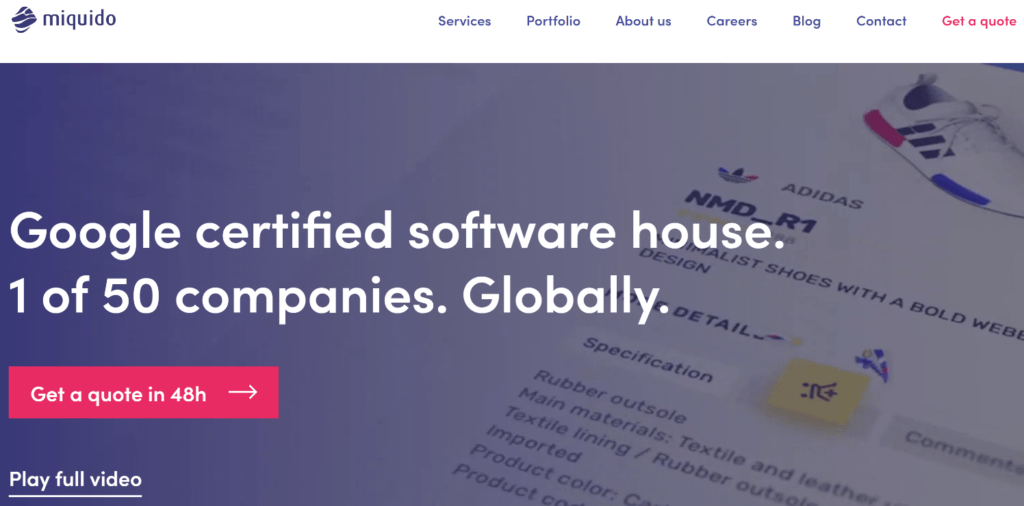 Source: Miquido
Source: Miquido
From there, your developers will set up a model for the front-end coding of your app and will develop the API (application programming interface) as well as decide on the back-end design.
7. Testing
Testing an eCommerce app is critical to ensure users don’t run into frequent problems and ensures the app works as intended. For example, there are many scenarios where payment platforms don’t work correctly through the app, leaving users frustrated and eager to jump ship.
After conducting system integration and device testing, you need to start fixing those bugs–do this by running several rounds of testing. Be sure to check the following:
- The workflow of the application
- If the payment gateway is working correctly
- Compatibility for web browsing
- The integration of social media
8. Deployment
Now we come to one of the most exciting parts: deployment; this is the stage where you need to ready your marketing materials. This is typically via social media but includes video ads to get the word out too.
Your eCommerce app needs to stay updated, and you need to be ready to deal with customer problems and solve new problems when they arise. Focus on the user experience, and the rest will sort itself.
9. Maintenance
Maintenance is a process that needs to happen long after the app is launched, so it’s best to have a long-term contract in place with an eCommerce app development service.
From there, keep your focus on the marketing, check which features are missing, and fix bugs as they appear. Think about and respond to users who may be finding it difficult to use your app, and where possible, respond promptly.
How much does it cost to develop an eCommerce mobile app?
Development costs of eCommerce apps vary but below are the average hourly estimates in the following countries:
- USA: $50–$200
- Canada: $50–$150
- Mexico: $40–$120
- UK: $50–$125
- Australia: $50–$125
- India: $25–$100
- Philippines: $25–$75
A developer can take anywhere from 1090 to 1400 hours to complete an app; creating the first version of the eCommerce app may take between three to four months.
The average cost of building an eCommerce app ranges from $40,000 to $220,000, but this depends on the app’s complexity–more features will mean a higher price. It’s always worth contacting the eCommerce app development company for an estimate beforehand.
eCommerce app development best practices & features
Here are some of the key aspects to consider when developing an eCommerce app, including best practices and both essential and advanced features.
Data security
An important area to consider is the security of customer data across your app. When users first sign into an eCommerce app, they’ll provide personal information such as a home address, credit card number and the number of their mobile phone.
It’s critical to protect this data to avoid disappointing your customers and also to ensure you don’t face any unwanted legal implications.
Using a private cloud helps to protect this data, as does defining access rules so that only premium users have access. Another wise move is to have an alarm system so that you are quickly informed of a threat and can act quickly.
Stability
Constant crashes and bugs can significantly affect your app’s performance–users are not going to stay around long when there’s so much choice, certainly if they’re frustrated by the experience.
To reach a good level of stability in your app then, you should do the following:
- Run QA tests
- Make several product iterations
- Get prompt feedback from users
- Release fixed updates
Doing all of this on a regular basis will ensure bugs get kept to a minimum.
eCommerce app developer example
 Source: Groovy
Source: Groovy
Scalability
Your app needs to be scalable to deal with a growing number of users as it becomes more popular. You may think there’s no need to consider this at the outset, but that couldn’t be further from the truth.
In fact, you need to forecast the growth of your app at the very beginning of your app’s development and plan your app’s architecture to accommodate it–in other words, have proper growth plans from the start.
Essential features
Your eCommerce app will also need to offer a series of essential features that few apps can do without overall.
The MVP (known as minimum viable product) is the minimum standard you can showcase your product to your target audience. These features fulfil the most crucial functionality that users expect of online shops.
You can forget adding those types of filters for your users then; these are the features your eCommerce app must have:
- Search functionality
- Admin panel
- The ability to filter products
- The ability to add products to a wish list
- A dedicated and working payment system
- Attractive user profiles that load quickly
- Smart authorisation
- Clear checkout process
- Easy registration
- Push notifications
In a nutshell: always focus on those features that provide maximum value to your customers. Gather feedback carefully, let your users tell you what features make sense to them, and then implement the changes.
eCommerce app developer example
 Source: Konstant Infosolutions
Source: Konstant Infosolutions
Advanced features
Advanced features are more optional features, but they can make your eCommerce app shine. Advanced eCommerce app features include the following extras:
- Voice search
- Behaviour tracking
- Image search
- Role-based dashboard
- Multilingual and currency
- Product recommendation
- Chatbot for customer support
- Efficient CRM systems
- Marketing tools
- Business intelligence
The more advanced features you add, the higher the cost of the app’s development, as we’ll see in the next section.
How can I benefit from eCommerce app development services?
With the increase in demand for eCommerce apps, partnering with eCommerce app creation companies allows you to create customer-centric apps that enable users to make easy purchases, which builds trust and keeps them loyal.
These developers are able to build highly-scalable B2B and B2C, as well as C2C and C2B eCommerce portals. Not only that, but they’ll be able to create customizable apps that make use of the latest tech and trends, all while being user-friendly.
eCommerce app developer example
 Source: Apptension
Source: Apptension
Some of the key benefits of eCommerce app development companies include the following:
- 24/7 assistance — Even after your app gets completed, they can provide support (as per your time zone).
- Full stack development — The developers will be highly experienced and skilled in the latest technologies.
- Flexible options — Tailor-made engagement plans are designed to fit every need, big or small, and typically come with superior scalability of technology resources.
- Agile development approach — Communication and proper documentation for support and training. Requirements, plans, and results are evaluated continuously.
- Business expertise — They often have years of experience in providing apps for businesses of all sizes.
- Data security — These developers consider user privacy and data security as top priorities and are dedicated to safeguarding them with secured keys, encryption, and firewalls.
- User-friendly — User-friendly app development for both iOS and Android platforms.
If you’re planning to develop an eCommerce app, it’s usually a good idea to get a free quote from the mobile app development experts. This is particularly true if you’re a non-developer or a beginner.
Work with a top eCommerce app development company
In today’s digital landscape, partnering with an eCommerce app development company is essential for creating a personalized shopping experience that meets the specific needs of your customers. These companies specialize in developing apps that offer tailored recommendations, seamless navigation, and convenient shopping features, all of which keep users engaged.
An eCommerce app development company can significantly improve your business’s engagement and conversion rates. With features like push notifications, personalized offers, and streamlined checkout processes, these companies help you guide users through the purchasing journey more effectively.
Working with an eCommerce app development company is also key to building customer loyalty. These companies create apps that allow you to offer exclusive deals, loyalty programs, and personalized content, helping to foster long-term relationships with your customers.
Moreover, an eCommerce app development company gives your business a competitive edge. With more consumers preferring to shop on apps and spending more time on mobile devices, having an app helps you stay ahead of competitors who only rely on traditional websites.
There are a number of app development companies that take on eCommerce app development services and have app developers with experience specifically catered to these apps.
Here we’ve put together for you a list of the best.


